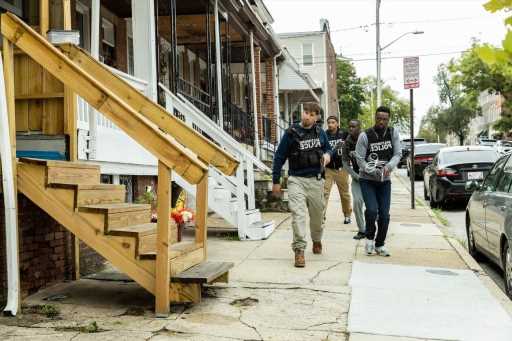Just in time for the 20th anniversary of “The Wire,” celebrated during the opening of French TV festival Series Mania currently unspooling in Lille, David Simon returns to Baltimore with HBO’s miniseries “We Own This City.”
Co-created with George Pelecanos and directed by Reinaldo Marcus Green, it focuses on true events described in Baltimore Sun reporter Justin Fenton’s nonfiction book, chronicling the inner workings of the Gun Trace Task Force: the Baltimore Police Department unit charged with racketeering, robbery, extortion and overtime fraud in 2017.
Jon Bernthal and Baltimore native Josh Charles star – as disgraced Sgt. Wayne Jenkins and GTTF detective Daniel Hersl respectively – as well as “Succession’s” Dagmara Domińczyk, McKinley Belcher III, Jamie Hector and Wunmi Mosaku.

While the expectations are high, Hector and Mosaku are quick to point out the differences between “We Own This City” and what has become known as “the greatest TV show of all time.”
“First of all, it won’t have multiple seasons. It’s a one-off and it’s precious all on its own,” says Mosaku at Series Mania. Trying to compare them would just “add too much pressure,” says the actor, previously seen in “Loki” and “Lovecraft Country.” But Hector, known for his portrayal of drug kingpin Marlo Stanfield in “The Wire,” was looking forward to working with Simon again.
“You know they are going to do it right. They are proven,” he says, cast here as homicide detective Sean Suiter. “Going back to Baltimore, there were so many people in front and behind the camera that I hadn’t seen in 15 years. Having been able to work with them again was a pleasure.”
With many scenes playing out in rooms and offices, Mosaku (playing attorney Nicole Steele, embarking on a disturbing investigation) had to resist the urge to make them more dramatic.
“It’s actually really hard. There is a lot of talking and, at least for my character, a lot of questioning. You just want to know the truth. How did this happen? Why? Sometimes I would go too far and Reinaldo was like: ‘Just ask him the question. Just be’,” she says.
Touching upon the protests sparked by the arrest and death of Freddie Gray in 2015, the series will take a look at their aftermath. Gray, arrested by the Baltimore police for allegedly carrying a switchblade, sustained injuries to his spinal cord while being transported in a van. He died a week later.
“That’s what makes this [GTTF] story all the more shocking. There has been so much attention on these issues, protests and calls for change, and these officers were doing these kinds of things right under the nose of the federal government,” says Justin Fenton, joining the actors in France.
“It’s a wake-up call about how serious the problems are and how serious the solutions need to be,” he adds. “It’s not a story from 30 years ago. It’s happening now. Baltimore is continuing to grapple with what we want the police to be, what role do we want them to play and how active they should be in trying to stop crime. That’s still to be determined.”
Hector explains: “We understood that this is going to affect Baltimore in a great way. We would address it by going to schools and talking to the community, having conversations about what is happening and what they are about to see.”
“So many lives were touched negatively in that 10-year period of the governor saying: ‘Just take them off the streets, make sure the corners are clear and you will get all the resources to make that happen, guilty or innocent.’ I think this is going to hit hard.”
The team got to know the people who were personally affected by Jenkins and Hersl’s actions, including rapper Young Moose, who namechecked the latter in his 2015 track “Tired.”

“People were being stopped five, six times in a year,” mentions Mosaku. “I would go to a coffee shop and [upon hearing what I was working on] they would say: ‘My sibling, my cousin, my friend – they have all been targeted’.”
Still, the story promises complex takes on all the people involved.
“As a reporter who covered this story, I remember sitting in the courtroom for the sentencing of Wayne Jenkins,” says Fenton.
“Everybody got up there and said: ‘He is the most present father, helpful to his family and friends.’ His coworkers said he was always at the office. I thought to myself: ‘How can you be all things to all people?’ It’s important to portray people as they are.”
“Sometimes you look at a person, saying: ‘I would never do that.’ But you do that,” adds Hector.
“Showing a great father, a great husband but a horrible man, or vice versa, is very important for the world to see. Just so that you can also ask about yourself: ‘Do I act like that? Do I have it in me?”
The six-episode series is set to premiere on HBO on April 25, 2022.
Source: Read Full Article
